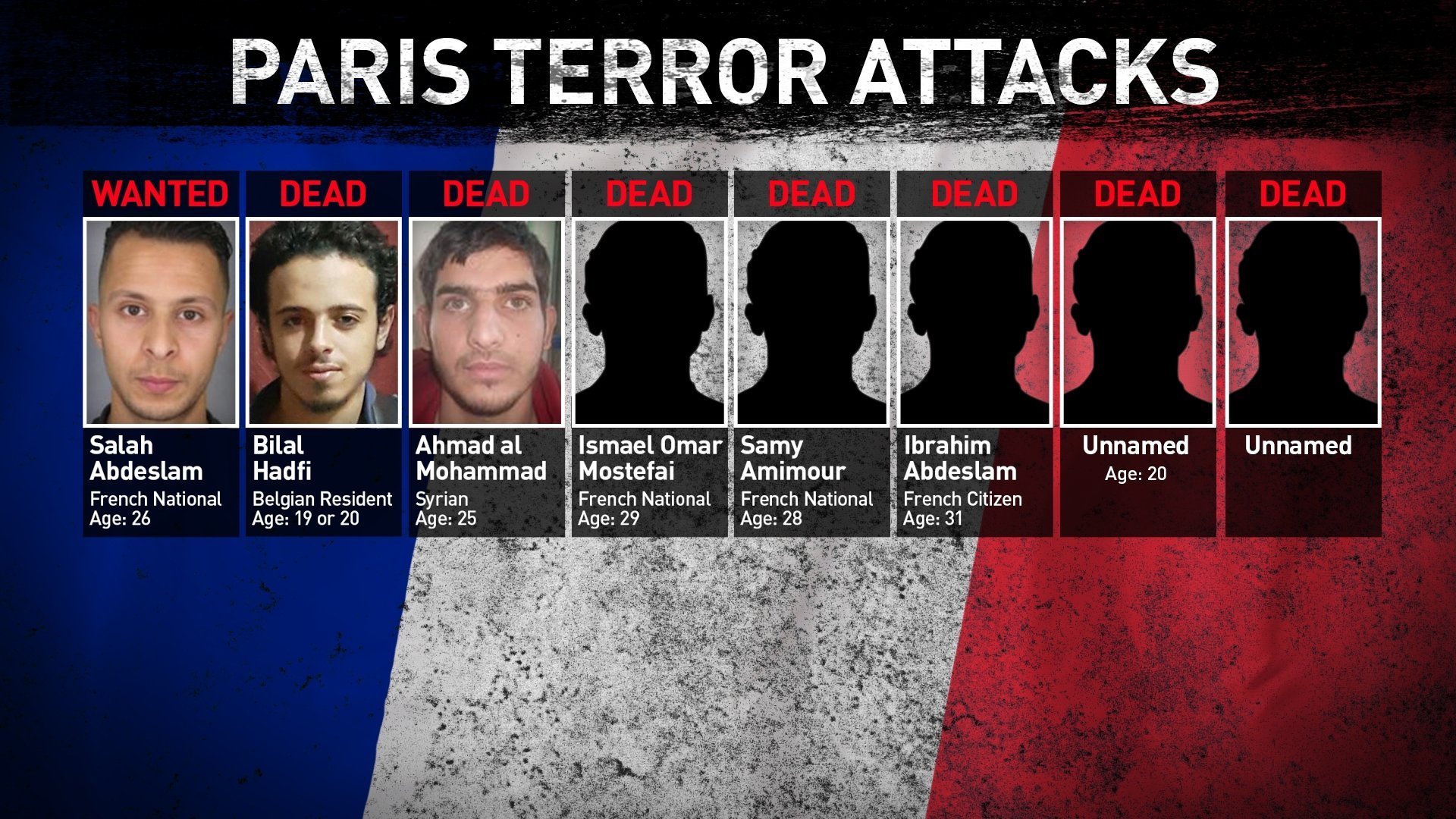The suspected ringleader in last week’s bloody terrorist attacks in Paris was killed in a pre-dawn raid Wednesday on an apartment building north of the French capital, the Paris prosecutor’s office announced Thursday.
Authorities zeroed in on a building in the Paris suburb of Saint-Denis after picking up phone conversations indicating that a relative of Abdelhamid Abaaoud, who authorities believe coordinated the shootings and bombings that killed 129 people, may have been there, a Belgian counterterrorism official said. French police believed Abaaoud himself was then still in the country, though they didn’t know exactly where.
It turns out Abaaoud was in that building in Saint-Denis. And after a violent firefight that included explosions and gunfire, he was dead.
In a statement released Thursday, the Paris prosecutor’s office said that Abaaoud’s body was found in the Saint-Denis building riddled with bullets. The office said that he was positively identified using papillary prints, which include patterns on fingers, palms and the soles of feet.
Exactly how he died, at this point, isn’t known. Police fired around 5,000 rounds of ammunition in the confrontation and used strong munitions that spurred a floor to collapse.
The prosecutor’s office said Thursday that “we still don’t know whether Abaaoud blew himself up or not.” That’s what officials say happened with the raid’s only other fatality, that of a woman suicide bomber that Belgian state broadcaster RTBF reported was Abaaoud’s cousin.
A police dog also died in the operation, while five police officers were slightly wounded.
Some residents in the area told CNN they had seen Abaaoud recently in the neighborhood and at a local mosque.
His death, though, does not mean French investigators’ work is over. Far from it.
For one, at least one Paris terror suspect, a French citizen named Salah Abdeslam, remains at large. And the threat from ISIS, which has boasted about the carnage and threatened more such attacks worldwide, remains very real.
Murky movements
Speculation about Abaaoud’s activities and movements has proliferated since officials began linking him to the Paris attacks in recent days, with many observers assuming he was operating in Syria.
The rumors became even more frenzied early Wednesday as it emerged that he was the potential target of the raid in Saint-Denis, the same area where ISIS suicide bombers had blown themselves up Friday outside the national stadium as the French soccer team played Germany inside.
Abaaoud had bragged in the past of being able to move between Syria and Europe at will. Western intelligence agencies are reported to have tried to target him in the months prior to the Paris attacks without success.
Suspects appeared ‘prepared to act’
While they have named Abaaoud, authorities have not yet identified the other terror suspect who died with him or the eight people detained in connection with the Saint-Denis raid.
Those held do include the person who loaned the apartment to the suspected terrorists and his friend, according to authorities. Two of the eight were hospitalized, the Interior Ministry said.
Whoever those inside the apartment were, they may have been preparing to unleash more terror on the streets of Paris.
The suspects appeared to be “prepared to act” in another possible attack, Paris Prosecutor Francois Molins said Wednesday, noting their weaponry, structured organization and determination.
Investigators are also still digging into other angles related to Friday’s attacks, including the whereabouts of Abdeslam, who was last seen heading toward the Belgian border in the hours after the massacres took place.
Officials are working to piece together where the terrorists were in the days and hours leading up to the attacks, and with whom they had contact. Seven of the attackers were killed during the attacks, mostly by blowing up the explosives strapped to their bodies.
Attacker’s cell phone found in trash bin
Investigators have encountered at least one piece of evidence that could help them in their search: One of the attacker’s cell phones was found in a trash bin outside the Bataclan concert hall, where most of Friday’s victims were gunned down.
A message on the phone, according to Molins, said, “Here we go, it’s starting.”
Authorities are trying to determine to whom the message was sent, he said.
The Saint-Denis police operation is the most dramatic among wave upon wave of raids across France in the aftermath of the Paris attacks.
Authorities are using the state of emergency declared by President Francois Hollande to carry out a widespread clampdown on potential terrorist threats, detaining dozens of people, putting more than 100 others under house arrest and seizing an alarming array of weapons.
Hollande, who wants to extend the state of emergency for three months, held up Wednesday’s deadly clash between police and suspects in Saint-Denis as further proof that France is “at war” with ISIS, which is notorious for brutally imposing its warped interpretation of Islam on the millions of people living in the territory it controls in Syria and Iraq.
France wants wider coalition against ISIS
The Paris attacks and ISIS’ claim of bringing down a Russian passenger jet over Egypt last month have underscored the extremist group’s desire to expand the reach of its terror.
Already part of the U.S-led coalition that’s bombing ISIS targets in Syria and Iraq, France has stepped up its airstrikes on the militants since the Paris attacks.
Hollande said he would appeal to world leaders to form a wider coalition to go after ISIS, including meeting next week with U.S. President Barack Obama and Russian President Vladimir Putin.
Russia has taken military action in Syria independently of the U.S.-led coalition, attacking ISIS but also other groups opposed to Syrian President Bashar al-Assad, a close ally of Moscow.



